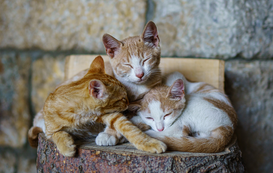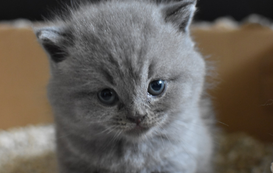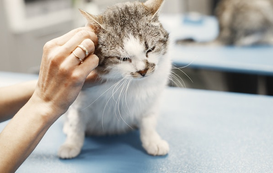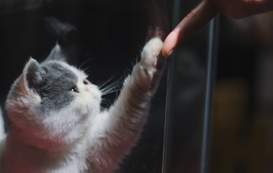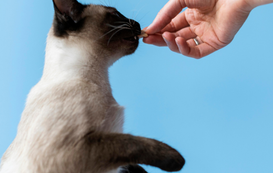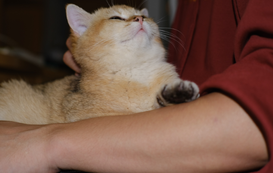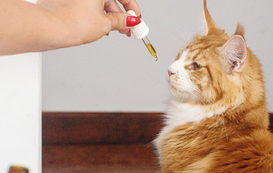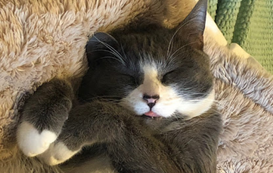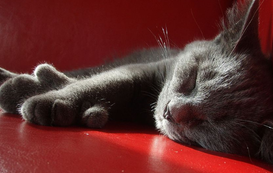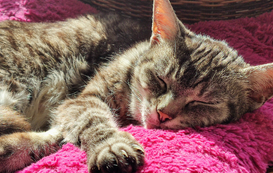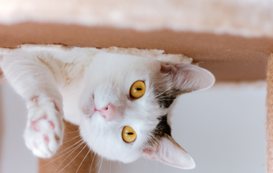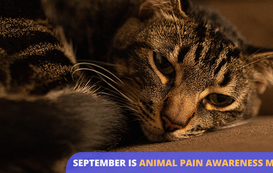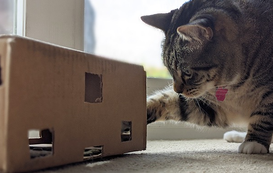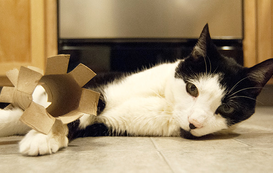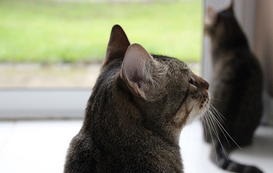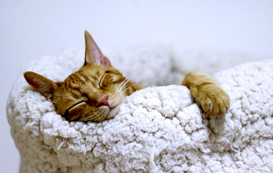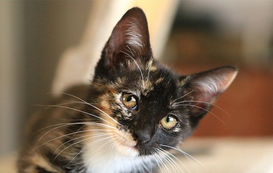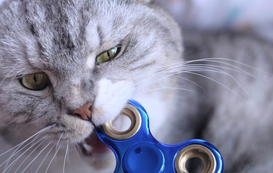Kittens are adorable, playful, sweet, and energetic creatures. They are full of personality and spunk at their young age, drawing love and affection from humans of all ages. I mean, c'mon, who doesn't absolutely adore kittens?
There are many quirky behaviors to observe during the short but sweet kitten stage. But what behaviors are normal for kittens to display and which behaviors are not? It's important to be able to spot the difference between normal and acceptable behaviors versus behaviors that may be red flags or warning signs of encroaching bad habits and in some cases, even sickness and disease. Taking a closer look at how your kitten behaves can help them grow up happy, healthy, and well-adjusted.
Normal Kitten Behaviors
First, let's start off with kitten behaviors that are completely normal. Kittens are incredibly energetic and have a lot of unique quirks, so it's important to know which behaviors are just a reflection of their eccentric personalities.
Smelling, Biting, and Chewing
Kittens are just experiencing the great big world for the very first time. Their sense of smell is extremely complex, and they explore and inspect the things around them by smelling everything. When they encounter something new or unfamiliar, their first instinct is to smell it, and then they will move on to testing it with a bite or two.
Many kittens will bite and chew on your fingers and toes, shoelaces, remotes, or wires-they don't yet know that these things aren't food or toys. Once they get a little bit older and have spent enough time smelling and chewing on things, they will be able to differentiate between what they actually want to bite and what they don't.
Mild Scratching
Young kittens spend some time getting acquainted with their bodies, which means that they are testing out all of their features, including their claws. Most kittens aren't scratching with the intention to inflict any pain-they aren't even fully aware of their capabilities yet.
They are still figuring out what they can do with them, and sometimes they will go a little too far by scratching people or furniture. Getting them a proper scratching post can help curb any excessive or unwanted scratching.
Meowing
When kittens are young, they are still testing out their vocality. They're kind of 'stretching their legs' in a sense when it comes to figuring out what noises they can make. It's not uncommon for kittens to be very vocal at times. This will usually subside a bit when they are older and calmer, so they won't meow nearly as much.
Playing and Play Fighting
Kittens have a ton of energy to get out. Remember when you were a little kid and felt like you could just play forever? Kittens experience the same thing. While they, like all cats, still love to sleep, they have a tendency to have a lot more energy when they are young. Playing is an important part of their growth and will help them achieve their balance, dexterity, and hunting instincts.
If you have multiple kittens, it's also very normal for them to play-fight with each other. The way kittens play and interact with each other is very different than how humans do, so what may seem aggressive to humans is perfectly normal for kittens.
Occasional Accidents
Kittens are basically furry babies. They do have a natural instinct to go to the bathroom in the litter box, but remember, they are still figuring the world out. It can be overwhelming. It's not uncommon for kittens to have one or two 'accidents' around the house before they fully get the hang of using their litter box.
Abnormal Kitten Behaviors
Now that you know which behaviors are normal for kittens to display, you can easily identify behaviors that are abnormal or could be warning signs for other more serious issues.
Aggressive Biting, Scratching, and Fighting
While exploratory biting and scratching are normal, anything with clear aggression behind it is not. If your kitten is displaying signs of aggression such as hard biting, scratching that draws blood, and dangerous fighting with other kittens, this is abnormal and problematic behavior.
Destruction of Furniture or Other Items
Most kittens are bound to get their claws onto something they shouldn't. Many times, it's inevitable. But it's not normal for them to completely destroy pieces of furniture like armchairs, sofas, and loveseats. This usually means they have misplaced energy or nothing to scratch. Providing your cat with proper playtime and a scratching post or two in the home can help.
Excessive Hissing
Some hissing is normal. Since cats can't talk, it's their way of showing that they are displeased or annoyed with something. But if they are hissing constantly, there could be a deeper problem. Cats also cannot express when something is wrong with them, so sometimes hissing is the best indication that there could be an underlying issue causing them pain. If your kitten is excessively hissing, consider taking them to the vet to rule out any pain.
Continuous Misuse of Litter Box
Kittens learn very quickly to use their litter box. One or two accidents here and there can happen, but it's definitely not normal for them to be continuously peeing or pooping outside of the litter box. This can be a sign that there is a bigger problem with their health. Going outside of the litter box can be a sign of urinary issues (such as feline lower urinary tract disease, or FLUTD), anxiety, some cancers, jealousy or territorial issues, and stress.
It's important to note any behaviors in your cat that seem abnormal or out of the ordinary. While some of them may just be habitual, others can be signs of some more serious health issues. If you are concerned with any behavior your kitten is exhibiting, consider contacting your trusted vet right away.
Frequently Asked Questions
Q: How can you tell the difference between playful biting and aggressive biting in kittens?
A: To distinguish playful biting from aggressive biting in kittens, observe the context and intensity of the bite. Playful bites are typically gentle and part of active play, without causing harm or distress. Aggressive biting, however, is often harder, accompanied by hissing or growling, and may be a defensive response to fear or irritation.
Q: What specific toys or activities are recommended to help redirect kittens from unwanted scratching?
A: To redirect kittens from unwanted scratching, provide various scratching posts and pads throughout your home, especially in areas where they scratch inappropriately. Engage your kitten with toys that encourage scratching on these appropriate surfaces.
Q: Are there specific training methods to help kittens learn litter box habits more effectively?
A: For litter box training, consistency is key. Place the kitten in the litter box after meals and naps to establish a routine. Using positive reinforcement, such as treats and praise when they use the box correctly, can also be very effective. Keeping the litter box clean and accessible is important for encouraging regular use.
Ready to find the purrfect sitter for your feline friend? Find a cat sitter on Meowtel today!





